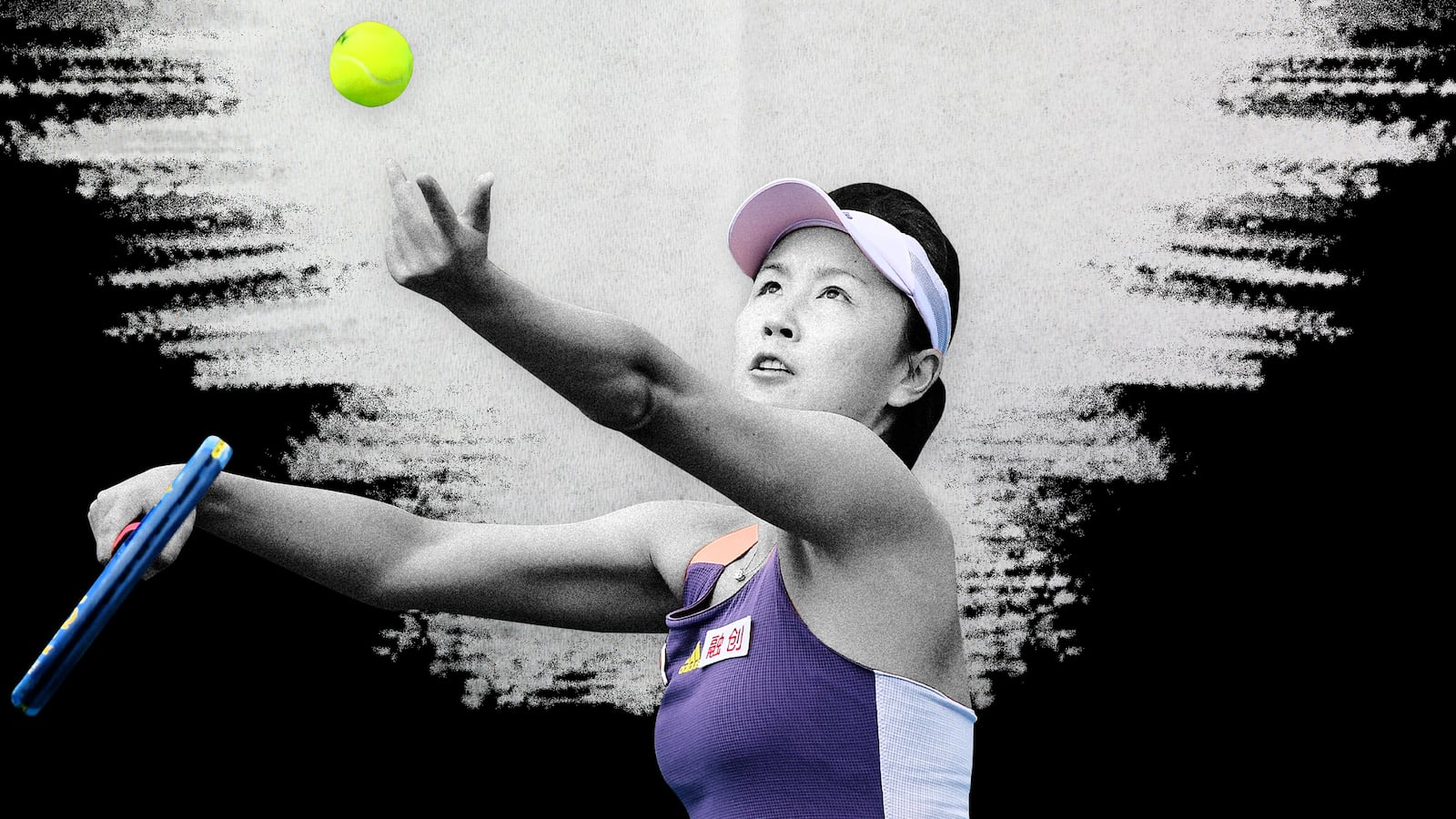China’s regime often tries to brush off controversies, but the propaganda efforts now underway show that the Communist Party knows it is losing control of the Peng Shuai situation.
The Chinese tennis star participated in a 30-minute video call with Thomas Bach, president of the International Olympic Committee, on Sunday, supposedly to assure him and the rest of the world that she was OK.
The call tells us Chinese leaders are worried that the Committee, even at this late date, will move the Winter Olympics from Beijing. The Games are scheduled to begin Feb. 4.
In a Nov. 2 posting on Weibo, a Twitter-like service in China, Peng accused Zhang Gaoli and his wife of forcing her to have sex with him. Zhang once served as a vice premier of the Chinese state and on the Party’s politburo standing committee, the highest ruling body in the country. Peng’s allegation of rape—she specifically mentioned the sex was without consent—was unprecedented in the 72-year history of the People’s Republic of China.
Peng’s posting was removed within a half-hour, and the three-time Olympic competitor and two-time Grand Slam doubles champion herself disappeared.
China’s regime has been disappearing a lot of people recently, but the Peng situation has evidently freaked out officials. For one thing, the Foreign Ministry had, until Monday, continually maintained it was “not aware” of the Peng situation.
Moreover, in recent days the Chinese propaganda machinery has gone into overdrive. Peng, for instance, has appeared in apparently staged videos and photographs posted by state and Communist Party propaganda officials on Twitter. One video, taken in a Beijing restaurant and featuring unusually stilted conversation, was almost certainly scripted to assure viewers that Peng was both alive and well on Nov. 20.
Beijing has reason to be concerned. Her charge of rape has not only given a shot in the arm to the #MeToo movement in China, it has also given new life to faltering attempts to move or boycott the Winter Olympics.
The change in attitudes is stunning. In February, for instance the senior IOC member Dick Pound termed calls to move the Games from China “silly.” Late last week, as the revelations about Peng swirled around the world, Pound admitted the situation “may spin out of control.” Although he doubted the IOC would ultimately take the Winter Olympics from China, he then said this to Reuters: “You never know.”
Beijing apparently does not know either. The most curious aspect of Peng’s call with Bach is her choice of phone pals.
If Peng on her own wanted to assure the world of her safety, she would probably have called an international broadcast network or Steve Simon, the chairman and CEO of the Women’s Tennis Association. Simon has led the charge on Peng’s behalf, even threatening to pull lucrative WTA events from China.
The IOC, on the other hand, has been disturbingly quiet about Peng’s disappearance. On Thursday, the organization said it was “encouraged by assurances that she is safe.” It then issued a statement praising “quiet diplomacy” and commenting that it would comment no further.
On Saturday, the day before the Peng-Bach call, the IOC noted it would “continue our open dialogue on all levels with the Olympic movement in China,” which meant the Committee was not inclined to talk to anyone outside the regime.
The International Olympic Committee, therefore, was a safe party for Beijing to dial on Sunday, and the Chinese IOC member Li Lingwei was on the call throughout, presumably acting as a minder.
As sports commentator Jane McManus asked on Twitter, “Why call the IOC, which has a huge financial interest in accepting China’s narrative, and not the WTA, which has people who know and worked with Peng?”
Peng called the IOC’s Bach, I think, because Beijing wanted to make sure the organization does not pull the February sporting extravaganza from China. This suggests Peng is not freely making decisions and remains subject to regime coercion.
Beijing may be winning only tactical propaganda victories, however. The larger story is that China is losing control of narratives, as PJ Media’s Rick Moran put it. Chinese leaders up to now have intimidated most of the world into accepting their storylines, or at least persuading them to remain quiet about obvious abuses, crimes, and atrocities.
For example, the regime, in an attempt to eliminate the identity of racial and religious minorities, is committed acts constituting “genocide” as defined in Article II of the Genocide Convention of 1948. In addition, the Communist Party is engaged in atrocities like mass detentions, state-organized killings, government-run slavery, officially sanctioned rape, and forced organ harvesting, to name just some.
None of these crimes has moved the IOC to openly criticize the Chinese regime. It is as if that organization has entirely forgotten the horrors of the 1936 Olympics in Adolf Hitler’s Berlin.
Peng’s plight, however, is fast eroding the Party’s ability to get what it wants, perhaps becoming the tipping point for global opinion. To amplify something Stalin may once have said, one person’s plight can move millions to action.
The Chinese regime can show off Peng and arrange video calls with tame complicit audiences, but it cannot let her speak freely. Taking down a senior official is far beyond what the Communist Party will allow at this moment. Beijing will, therefore, stumble from one clumsy propaganda event to another as it tries to regain narrative-control.
One woman, Peng Shuai, can now deny or grant Beijing propaganda victories. By what she says, she can determine the fate of a mighty regime.


